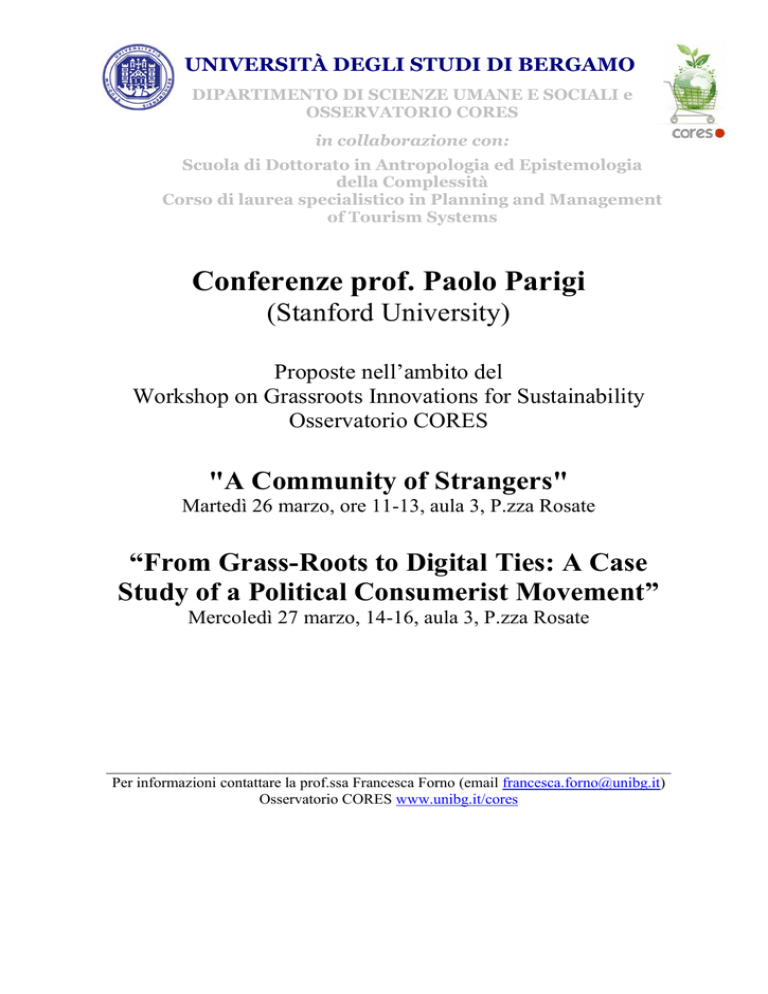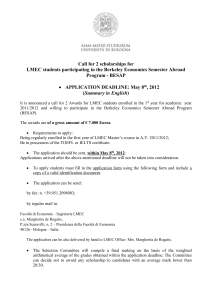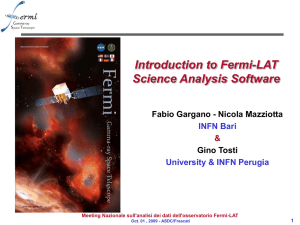
UNIVERSITÀ DEGLI STUDI DI BERGAMO
DIPARTIMENTO DI SCIENZE UMANE E SOCIALI e
OSSERVATORIO CORES
in collaborazione con:
Scuola di Dottorato in Antropologia ed Epistemologia
della Complessità
Corso di laurea specialistico in Planning and Management
of Tourism Systems
Conferenze prof. Paolo Parigi
(Stanford University)
Proposte nell’ambito del
Workshop on Grassroots Innovations for Sustainability
Osservatorio CORES
"A Community of Strangers"
Martedì 26 marzo, ore 11-13, aula 3, P.zza Rosate
“From Grass-Roots to Digital Ties: A Case
Study of a Political Consumerist Movement”
Mercoledì 27 marzo, 14-16, aula 3, P.zza Rosate
_________________________________________________________________________
Per informazioni contattare la prof.ssa Francesca Forno (email [email protected])
Osservatorio CORES www.unibg.it/cores
Abstracts:
"A Community of Strangers"
P. Parigi, B. State, D. Daklallah, R. Corten and K. Cook
In this paper we explore two contrasting perspective on individual’s participation in
associations. On the one hand, some have considered participation the byproduct of preexisting friendship ties—the more friends one has in the association, the more likely he or
she is to participate. On the other hand, some have considered participation driven by the
association’s capacity to form new identities—the more new friends one meets in the
association, the more likely he or she is to participate. We used detailed temporal data on
an online association to adjudicate between the two mechanisms and their interplay. Data
for our analysis came from a sample of members of CouchSurfing, an international
hospitality organization established in 2003. Members of CouchSurfing engage in
hospitality exchanges with other members of the organization, with host and guest often
previously-unknown to each other, and form friendship ties as a result of these interactions.
Our results show a significant impact of new friendships ties on participation but a
negligible impact of pre-existing friends. We relate this finding to sociological literature on
participation and we explore its implications in the discussion.
*.*
“From Grass-Roots to Digital Ties: A Case Study of a Political Consumerist
Movement”
P. Parigi and Rachel Gong
New grassroots organizations that target ethical consumer choices and behaviour represent
a departure from traditional social movement organizations. In this paper we study the
activists of one of these organizations and show that social network ties formed mainly
online greatly reinforce commitment toward the goals of the movement. We suggest that
online ties, i.e., digital ties, are important for political consumerism movements because
they create audiences for private actions. It is because of the presence of these audiences
that the individual participants can re-interpret their actions into public ones. We used an
online survey to collect data on the users of the Transition U.S. social website on
Ning.com. Over half of respondents have experiences with political activism. However,
their responses indicate that they are dissatisfied with traditional means of political
participation (e.g. rallies) and prefer non-contentious collective actions (e.g. local
gardening). Respondents perceive community organizing to be the most effective way to
bring about social change, deprioritizing connections to local government. Furthermore,
respondents that formed digital ties with other activists were significantly more likely than
respondents that had no ties with other activists to adopt consumer changes consistent with
the goals of the movement. We interpreted this finding as an indicator that digital ties share
some of the characteristics of strong ties and we explored this similarity in paper.


